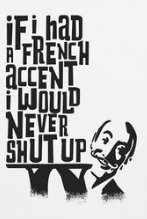CORRECTION FOR DAY 9
1 Charlotte was 3 when she moved.
2 The garden was very large.
3/ They built a tree house.
4/ They added a food elevator that was made of a basket and a rope.
5/ When Charlotte and her family went back to their house, they realized the garden was much smaller than in their memories, which means they were disappointed.
What about you ? Tell me about your wish list.
1 If I could, I would + verb
2 If I had to stay on a desert island, I would bring……..TO +
3 I would listen to … because….
4 I am…..My family is…..
5 I communicated with…/ I didn’t communicate with
6 I exercised…. and I …… jumped/ I did some push-ups/ I danced….I didn’t exercise…..7 Did you help your family ? How did you help your family ? By doing what ?
7 I watched…. I didn’t watch….. I advise you to watch…. You should watch….
8 I listened to …. My favourite music during lockdown is…..
9 I don’t usually do any DIY. I sewed/ I am knitting/ I baked a cake/ I built/ I painted/
10 I advise you to cook … This is a good recipe…
DAY 10
- WATCH MY PREZI PRESENTATION or VISIT MY OTHER BLOG at lewebpedagogique.com/howartyou and choose the Propaganda vs caricature tag.
- If you can’t watch the presentation, read these paragraphs :
1 What is a caricature ?
It is a drawing of a real person which *distorts or exaggerates certain *features, it is an exaggerated portrait and its *purpose is to ridicule or satirize a subject, especially public *figures and politicians, to expose hypocrisy and corruption and if it has a moral message, it is considered a satire.
Satirists traditionally ridicule both Government and Opposition, and have a significant power at the tip of their pen. A common criticism of caricatures is that they may be one of the most populist forms of art. Authorities may be tempted to *ban *seditious types of art, and especially political caricatures. Democracies usually tolerate them.
Some satirists have become famous by their *ability to *match a subject’s mental state to a physical defect.
Cartoons serve as a version of editorial opinion when it makes political satire.
LIST THE VOCABULARY AND ANSWER THE QUESTIONS AFTER READING THE TEXT :Etablissez une liste de vocabulaire anglais-français. Répondez aux questions. Les réponses sont dans le texte.
What is the nature of a caricature ? What does it do ? What is the intention of the artist ? Who is generally *under attack ? What is the reaction of a democracy to a caricature ? What media publishes caricatures ? Are caricatures neutral ? Can they simplify debate too much ? What is specific to satire ?
*ability = capacité/*ban=interdire/*distort=déformer /*expose =dénoncer/ *features= traits/*figures= personnages/*match= associer/*populist=populiste/*power=pouvoir/*purpose=but/*seditious= subversif, révolutionnaire/*under attack = attaqué/
2 WHAT IS PROPAGANDA ?
Propaganda : *dissemination of information—facts, arguments, rumours, *half-truths, or *lies—to influence public opinion.
Propaganda is the systematic effort to manipulate other people’s *beliefs or actions. *Deliberateness and manipulation distinguish propaganda from the free and easy exchange of ideas. Propagandists have a specified *goal.
To *achieve this, they deliberately select *facts and arguments.
To maximize effect, they may *omit or distort pertinent facts or simply lie. *Deliberate selectivity and manipulation also distinguish propaganda from education. Educators try to present *various sides of an *issue. Education *aims to induce reactors to collect and evaluate *evidence for themselves and assists them in learning the techniques for doing so.
The word propaganda itself is often a pejorative one tending to connote such things as the discredited atrocity stories and deceptively stated war aims of World Wars I and II, the operations of the Nazis’ Ministry of Public Enlightenment and Propaganda, and of *countless *instances of false and *misleading *advertising.
*achieve=atteindre un but, réussir/*advertising= publicité/*aims to=avoir pour but de /*beliefs=croyances/ *countless=infini/*deliberate=délibéré/*dissemination=propagation/*facts=faits/*goal=but/*half-truths=semi-vérité/*instances=exemples/ *issue=problèmes, questions, problématiques/*lies=mensonges/*misleading=volontairement erronés, malhonnêtes/ *omit= omettre, laisser de côté/*various=divers, différents
LIST THE VOCABULARY AND ANSWER THE QUESTIONS AFTER READING THE TEXT :Etablissez une liste de vocabulaire anglais-français. Répondez aux questions. Les réponses sont dans le texte.
What is the nature of propaganda ? What does it do ? What is different between debate and propaganda ? What is negative about propaganda ? What do educators do ? What political regimes used propaganda ? Is propaganda used in fields that are not political ?

